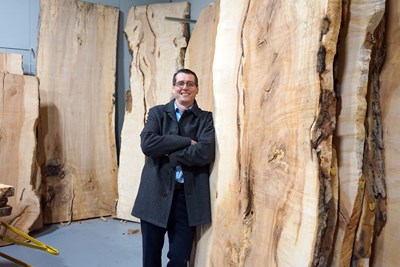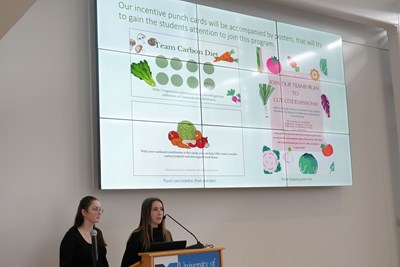
Sustainability News
-

-

-
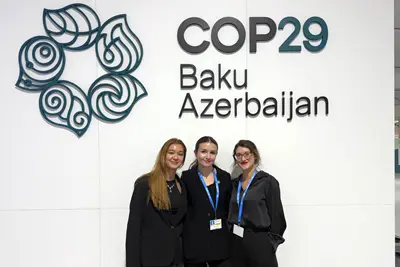
Students Find Inspiration at United Nations Climate Summit
Three students attended COP29 in Azerbaijan, thanks to funding from the Rist Institute for Sustainability and Energy. -

Taking on Green Energy Projects Before a Second Trump Term
Outcomes depends on relationship between federal government and states, says Professor Juliette Rooney-Varga. -

Eat Local in the University Dining Halls
With a new sustainability coordinator, the dining halls are incorporating more local produce and hosting sustainability-related events. -
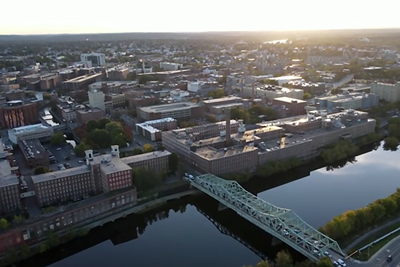
New Center Taps into Community to Develop Climate Resilience Model
The Massachusetts Gateway Cities Climate Resilience Center seeks to develop a community-driven climate resilience model in Lowell that can be replicated in other cities. -
Business Alum Branches Out to a New Career
Business alum Sean Harrington ’97, an All-American wrestler at UMass Lowell, has started Wolf Tree Wood, which sells one-of-a-kind wood slabs that can be used for custom furniture. -
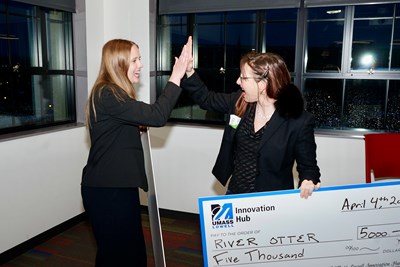
Entrepreneurs Earn Green at Clean Green Challenge
Six sustainability-focused entrepreneurs and startups from across the region competed in the third annual Clean Green Challenge at the UMass Lowell Innovation Hub. -
From Carpooling to Lowering Meat Consumption, Students Look to Reduce Carbon Footprint
Students competing in the Climate Mitigation Challenge came up with innovative ways to reduce carbon dioxide emissions by 10,000 pounds in 10 weeks. -
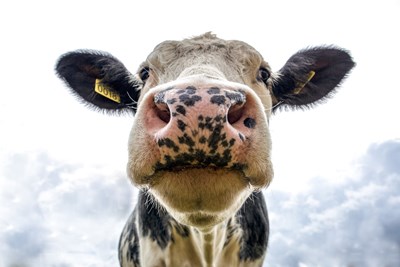
Climate Change Combat: Turning Cow Burps to Alternative Fuel and Storing Carbon Dioxide in Rocks
Chemistry Asst. Prof. Michael Ross received two Scialog: Negative Emissions Science awards for his greenhouse gas research proposals. -

Students Call for More Climate Action After COP28
Students represented UMass Lowell in Dubai at COP28, the annual United Nations climate summit. -

Five Sustainable Ways to Celebrate the Holidays
These helpful tips will have you enjoying the holidays with sustainability in mind. -

From Seed to Sauce
Craic Sauce has created a UMass Lowell-branded hot sauce made with peppers grown on campus. -
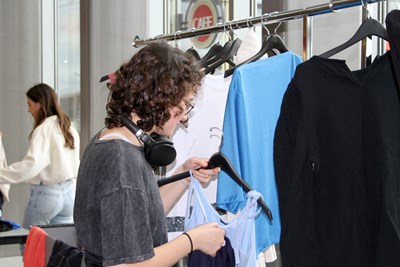
Feeling Thrifty? Students Glow Up with Castoffs
The Student Society for Sustainability hosted a Thrift Day event with clothes collected from the UMass Lowell community. -

Sustainability Projects Take Shape on Campus
The Rist Institute for Sustainability and Energy granted fellowships to mechanical engineering major Caralyn Conrad, industrial engineering Ph.D. student Mahsa Ghandi and Art and Design Assoc. Prof. Kirsten Swenson. -

Rist Institute Welcomes Environmental Defense Fund Fellow
Environmental Defense Fund fellow Dillan Patel has worked with UML’s Rist Institute for Sustainability and Energy over the summer to help create a community outreach plan for a geothermal pilot project. -

Climate Scientists Discuss Effect of Canadian Wildfires on U.S.
UML climate scientists break down the wildfires in Canada and why the U.S. is feeling its effects. -

Funding Plants the Seed for Innovative Sustainability Projects
Five projects created by members of the UML community received Sustainability Engagement and Enrichment Development (S.E.E.D.) funding from the Rist Institute for Sustainability and Energy. -

UMass Lowell Blooms into Certified Arboretum
A ceremonial planting on South Campus signified UMass Lowell’s new role as a certified arboretum – a place where trees and other plants are cultivated for scientific and educational purposes. -

UML Partners with Lowell, National Grid to Explore Renewable Energy
UMass Lowell was the first site selected for National Grid’s geothermal pilot project, which will heat and cool buildings in the area with utility-scale networked geothermal energy. -
Chemistry Lab Group Makes Scientific Discovery
Chemistry Asst. Prof. Michael Ross’ lab group found that nanoparticles combining post-transition and noble metals absorb higher energies of light. Their discovery is highlighted in Matter, a scientific journal published by Cell Press. -

Engineering Professors’ Research on Plastics Recycling and Sustainability Gets $1M
Prof. Meg Sobkowicz-Kline and Asst. Teaching Prof. Akshay Kokil were awarded funding totaling $1 million by the National Science Foundation and the National Institute of Standards and Technology for projects that aim to reduce the amount of plastic that ends up in landfills and the environment each year. -

Students Measure Trees to Help Lowell with Climate Resilience Project
Students taking the newly launched Climate Crisis and Society course worked in partnership with the city of Lowell on a climate resilience project. The work inspired them to develop their own climate projects. -
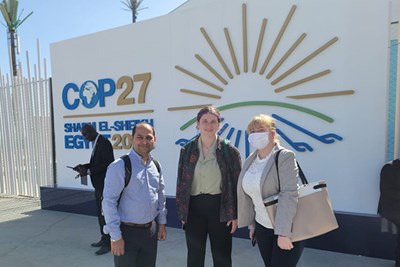
COP27 Empowers Students to Address Climate Change
Three students and three faculty members traveled to Sharm El Sheikh, Egypt, for COP27, the United Nations climate summit, where they were the only delegation from a public university in Massachusetts. -

Community Shops Local at UML’s New Indoor Winter Farmers Market
The Rist Institute of Sustainability and Energy kicked off the newly launched Indoor Winter Farmers Market, featuring Lowell-based vendors. -

Local K-12 Students Use Art to Teach Public About Extreme Weather
The National Science Foundation-funded project Cool Science hosted its 10th annual Extreme Weather Art Competition for students in grades kindergarten through 12th. The winning posters are now displayed on transit buses in the Merrimack Valley and Worcester areas. -

New Sustainable Publishing Fund Supports Faculty Research in Open-Access Journals
The Office of Sustainability and the University Library created the Sustainable Publishing Fund to help researchers, like Chemical Engineering Asst. Prof. Fanglin Che, publish their sustainability-related work in open-access journals. -
S.E.E.D. Fund Recipients All About the Green
Seven projects led by students, faculty and staff received a share of the university’s annual $50,000 Sustainability Encouragement & Enrichment Development (S.E.E.D.) Fund. -

Professor Educates Children About Environment Through Art
Art Assoc. Prof. Ingrid Hess is traveling to some of the world’s most beautiful places to make artwork that educates children about the natural world and environmental sustainability. She’s won grants, fellowships and artist residencies to visit national parks in Costa Rica, Australia, the U.S. and more. -
Students Take the Lead at Sustainability Symposium
Hosted for the first time by UMass Lowell, the Student Sustainability Leaders Symposium brought together more than 100 students from 18 colleges and universities across the Northeast to share their work and explore opportunities for collaboration and partnerships. -
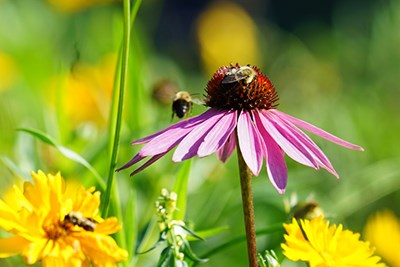
UML Climbs to New Heights for Sustainability
UMass Lowell remains the highest-rated campus in Massachusetts for sustainability with a STARS Gold score of 83.37 from the Association for the Advancement of Sustainability in Higher Education. -
Four Ways River Hawks Can Beat Sky-high Gas Prices
If you’re spending more on gas to get to campus, the university has several ways to save money on your commute — while decreasing carbon emissions. -

Researchers Developing Solution to Reduce Waste Plastic Films
Researchers led by Chemical Engineering Assoc. Prof. Hsi-Wu Wong was recently awarded a three-year, $1.6 million grant by the U.S. Department of Energy to help reduce waste plastic films. -
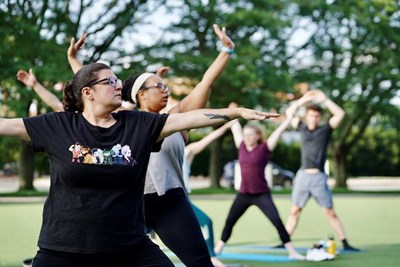
UML Recognized for Wellness Initiatives
UMass Lowell, which ranks No. 1 among colleges and universities for well-being and work according to the Sustainable Campus Index, has created an Office of Student Life and Well-being to better integrate wellness across campus. -

‘Fall Into Recycling’ Returns, Diverting Over 6 Tons from Landfills
More than 6 tons of appliances, electronics, batteries and more were collected at Fall into Recycling, a popular waste diversion program that contributed to UMass Lowell being named a Top 10 Zero Waste Campus by the Post-Landfill Action Network. -

Professor: Science Education Can Help Slow Climate Change
Science education can help slow the pace of global warming, because people who understand climate science can make informed decisions, says Education Assoc. Prof. Jill Hendrickson Lohmeier. Lohmeier does research on using artwork in informal settings to educate the public about climate science. -

UMass Lowell Wins Grant to Diversify Offshore Wind Workforce
UMass Lowell, in partnership with the Benjamin Franklin Institute of Technology in Boston, has received a $241,300 grant from the Commonwealth to develop academic pathways that increase the participation of underrepresented populations in the offshore wind industry. -

O’Leary’s New Rooftop Garden More Than a Pretty View
A new rooftop garden of 500 herb, flower and vegetable plants has taken root at O’Leary Learning Commons on South Campus, the latest piece of UMass Lowell’s Urban Agriculture Program — a collaboration between the Office of Sustainability and Mill City Grows. -

Hammocks and Patio Heaters: UML Enhancing Outdoor Spaces
Hammock gardens, Adirondack chairs and patio heaters are just some of the amenities the university is adding to improve outdoor spaces for when students return to campus in the fall. -

School and Work Intersect for Transportation Engineering Graduate Student
Transportation engineering graduate student Jenna Howard ’19 is leading the design of UML’s Pawtucket Greenway project through her work as a transportation infrastructure designer for the civil engineering firm TEC. -

Urban Sustainability Projects Get $50K Boost
The Lowell Green Community Partnership, an alliance between UMass Lowell and the city, awarded its first $50,000 in grants to five joint university-community projects that advance urban sustainability initiatives. -

America East Schools Team Up to Champion Sustainability
With the collaboration between UMass Lowell’s Office of Sustainability and its Athletic Department serving as a model, the America East Conference has created a sustainability network that gives its 10 member institutions an opportunity to share best practices and advance green initiatives. -

UML Named ‘Innovator of the Year’ for Waste Management
UMass Lowell was named “Innovator of the Year” at the first-ever Casella Sustainability Leadership Awards for the new and creative ways that the university sustains resources and diverts waste destined for landfills. -

New Seminar Series Explores Climate Anxiety, Plastics Sustainability and More
UMass Lowell’s Climate Change Initiative, in partnership with the Environmental, Earth & Atmospheric Sciences Department and the Rist Institute for Sustainability and Energy, is hosting a virtual spring seminar series featuring experts from across the country. -

Rist Institute for Sustainability and Energy Awards First Fellowships
The Rist Institute for Sustainability and Energy has awarded its inaugural fellowships to Asst. Prof. of Economics Kelly Hellman, plastics engineering major Kerry Candlen and chemical engineering major Maria Fonseca-Guzman. -
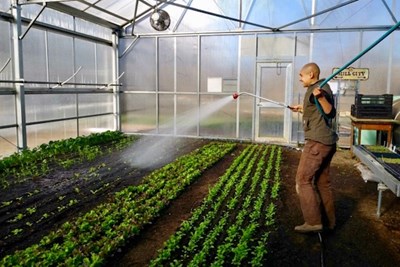
UML’s Greenhouse Helps Ease Growing Food Insecurity
As food insecurity grows because of the coronavirus pandemic, the university’s Urban Agriculture Program is helping to provide fresh, healthy produce to the community through its partnership with Mill City Grows. -
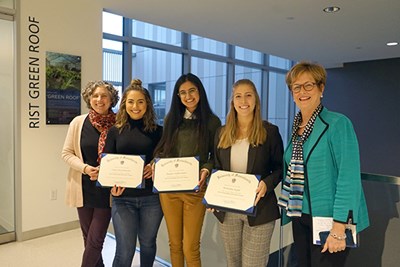
How to Lose 10,000 Pounds (of CO2) in Just 10 Weeks
Three student projects proposing ways to reduce the university community’s carbon dioxide emissions by 10,000 pounds in 10 weeks received the first-ever Rist Institute for Sustainability and Energy (RISE) Student Innovation Awards and a share of $1,000 in prize money. -

Sustainable Move-In Unpacks a Punch
The Office of Sustainability held its first Sustainable Move-In event on campus, collecting 62 large trash bags of plastic foam and enough cardboard to fill four large dumpsters. -

Students Engineering Better Way to Clean City’s Canals
Rover the River Hawk, an Industrial Capstone Senior Design project that Engineering students are building to clean debris from the city’s canals, received a Green Design award from the Lowell Sustainability Council and a Certificate of Special Congressional Recognition from U.S. Rep. Lori Trahan. -

UML Recognized for Waste Reduction Efforts
The university’s waste reduction efforts ranked fifth in the 2019 Sustainable Campus Index, up five spots from the previous year. The university’s Urban Agriculture Program was also highlighted in the index, which is published by the Association for the Advancement of Sustainability in Higher Education (AASHE). -

It’s Never Too Early to Learn About Climate Change
The UMass Lowell Climate Change Initiative, in conjunction with the National Association of Geoscience Teachers and the College of Education, hosted a professional development workshop for two dozen area K-12 teachers on incorporating climate change education into the classroom. -

Student Donations Go Back into the Community
Students donated more than 14,000 pounds of clothing, bedding, food and personal items during this spring’s Sustainable Move Out Donation Drive, which benefitted a half-dozen nonprofit organizations across the community. -
Mow Town: Sheep Do the Job at ‘EweML’
From grazing sheep to battery-powered lawn mowers, Grounds Operations Manager Erik Shaw is coming up with innovative ways to maintain the campus grounds – and help boost the university’s sustainability efforts. -

Researchers Produce Renewable Engine Fuel from Wet Biowaste
A team of researchers from UMass Lowell, the University of Illinois at Urbana-Champaign and China Agricultural University in Beijing has developed a new, sustainable way of converting wet biological waste into diesel-compatible fuel, using heat and water. -

‘Spring Into Recycling’ Helps River Hawks Declutter
Faculty, staff and students dropped off more than 6 tons of personal electronics, appliances and more during April’s two-day Spring Into Recycling event, run by the Office of Sustainability and Information Security. -

Faculty Experts Brief Legislators on Climate Change
The university’s Climate Change Initiative hosted members of the state’s House Committee on Global Warming and Climate Change for a roundtable discussion on climate science and policy at which faculty members shared scientific research and expertise to help inform policy decisions. -

Rooftop Garden Takes Urban Agriculture to Another Level
Rows of kale, Swiss chard and collard greens are growing on the new Green Roof vegetable garden at University Crossing, a collaboration between Mill City Grows and UML’s Urban Agriculture Program, Student Government Association and Office of Sustainability. -

UML Celebrates Energy Savings, Sustainability on Earth Day
The university marked two major milestones at its Earth Day celebration: the completion of its $23.1 million Accelerated Energy Program and its latest STARS Gold rating, which moves UML into the top 10 nationally. -

UML Celebrates Sustainability Program
UMass Lowell and the Division of Capital Asset Management and Maintenance (DCAMM) celebrated the completion of the university's $23.1 million Accelerated Energy Program (AEP) at a ceremony Monday. -

S.E.E.D. Grants Cultivate 12 New Campus Sustainability Projects
Six of the 12 projects to receive a share of the $50,000 Sustainability Encouragement & Enrichment Development (S.E.E.D.) Fund this year were led by students, the most in the fund’s three-year history. -

Bookstore Switches from Plastic to Paper Bags
The River Hawk Shop now gives customers recyclable paper bags instead of single-use plastic bags, a move that will eliminate around 10,000 plastic bags from the waste stream each year.

